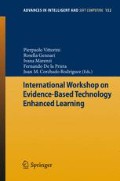Abstract
Nowadays, circa 10% of 7-11 olds turn out to be poor comprehenders: they demonstrate text comprehension difficulties, related to inference making, despite proficiency in low-level cognitive skills like word reading. To improve the reading comprehension of these children, TERENCE, a technology enhanced learning project, aims at stimulating inference-making about stories. In order to design and develop the TERENCE system, we use a user centred design approach that requires an in depth study of the system’s main end-users, namely, its learners and educators. This paper reports the user classes building process for learners by means of user-centred design field studies.
Access this chapter
Tax calculation will be finalised at checkout
Purchases are for personal use only
Preview
Unable to display preview. Download preview PDF.
References
Alrifai, M., Gennari, R., Tifrea, O., Vittorini, P.: The Domain and User Models of the TERENCE Adaptive Learning System. In: Proc. of eb. TEL 2012. Springer (2012)
Alrifai, M., Gennari, R., Vittorini, P.: Adapting with Evidence: the Adaptive Model and the Stimulation Plan of TERENCE. In: Proc. of eb. TEL 2012. Springer (2012)
Di Mascio, T., Gennari, R., Vittorini, P.: The Design of An Intelligent Adaptive Learning System for Poor Comprehenders. In: Proc. of Cognitive and Metacognitive Educational Systems 2010. IADIS (2010)
Gasperis, G.D., Mascio, T.D., Florio, N.: Tatot: a viewer for annotating stories in the terence project. In: Proc. of ITAIS 2011 (2011)
Goransson, J., Boivie, B., Blomkvist, I., Persson, S., Cajanger, J.: Key principles for user-centred systems design. Behavior and Information Technology 22(6), 397–409 (2003)
Hartson, H., Andre, T., Williges, R.: Criteria for Evaluating Usability Evaluation Methods. International Journal of Human Computer Interaction 13(4), 373–410 (2001)
Mascio, T.D., Gennari, R.: A Usability Guide to Intelligent Web Tools for the Literacy of Deaf People. In: Integrating Usability Engineering for Designing the Web Experience: Methodologies and Principles, pp. 201–224. ICI Global (2010)
Pasini, M.: Working document 1.1: User classification and identification. Technical report, TERENCE project (2011)
Slegers, K., Gennari, R.: State of the Art of Methods for the User Analysis and Description of Context of Use. Technical Report D1.1, TERENCE project (2011)
Slegers, K., Mascio, T.D.: Working document 1.2: Usability goals and user needs. Technical report, TERENCE project (2011)
Author information
Authors and Affiliations
Editor information
Editors and Affiliations
Rights and permissions
Copyright information
© 2012 Springer-Verlag Berlin Heidelberg
About this paper
Cite this paper
Di Mascio, T., Gennari, R., Melonio, A., Vittorini, P. (2012). The User Classes Building Process in a TEL Project. In: Vittorini, P., Gennari, R., Marenzi, I., de la Prieta, F., Rodríguez, J. (eds) International Workshop on Evidence-Based Technology Enhanced Learning. Advances in Intelligent and Soft Computing, vol 152. Springer, Berlin, Heidelberg. https://doi.org/10.1007/978-3-642-28801-2_13
Download citation
DOI: https://doi.org/10.1007/978-3-642-28801-2_13
Publisher Name: Springer, Berlin, Heidelberg
Print ISBN: 978-3-642-28800-5
Online ISBN: 978-3-642-28801-2
eBook Packages: EngineeringEngineering (R0)

